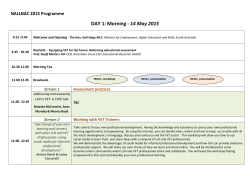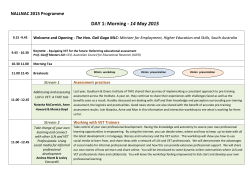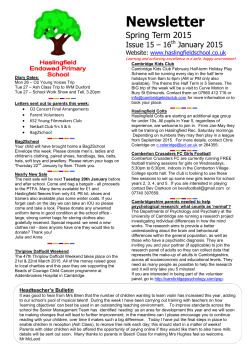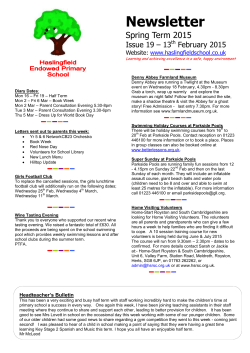
DAY 2: Morning - 15 May 2015 - Australian Council for Educational
NALLNAC 2015 Programme DAY 2: Morning - 15 May 2015 9.15 - 10.00 Keynote - Investing in the future: Equipping workers through foundation skills Anthony Kittel: CEO and Managing Director of REDARC Electronics and one of the National Foundation Skills Strategy Project Workplace Champions. 10.00 - 10.30 Morning Tea 10.30 -12.15 Breakouts Stream 1 90min workshop 45min presentation 45min presentation Assessment practices What is FSAT? 10.30 -12.15 The development and implementation of the Foundation Skills Assessment Tool(FSAT) Martin Burdis & Dave Tout Stream 2 10.30 -11.15 TBC The new online Foundation Skills Assessment Tool, commissioned by the Australian Government and designed to assess an individual’s foundation skill levels? The Australian Council for Educational Research (ACER) won the contract to develop the comprehensive Foundation Skills Assessment Tool to identify and assess an individual’s foundation skill levels. The FSAT will be based around the theoretical underpinnings of the Australian Core Skills Framework (ACSF) and the Core Skills for Work Developmental Framework (CSWF). Why was FSAT developed and what will it support us to do? Will FSAT be useful or will it be yet another imposition? Hear a bit about the FSAT story, and what it could mean for you and your work. Nearing completion, this presentation will offer insights and information about not only what is included in FSAT, but how such assessment tools are developed so they are valid and reliable and how some skills can be assessed online using computer adaptive features to target the assessment appropriately. Working with VET Trainers The session will be a facilitated conversation where delegates can understand the effect on VET teachers of moves to embed LLN in VET teaching. We will explore the implications for learners and for policy implementation. 11.30 - 12.15 SIHHCLS201A + TAELLN411 + FSKNUM08 = A simple sum for a VET teacher? Dr Carolyn Johnstone Stream 3 10.30 -12.15 Lessons for disengaged youth: a fresh start Carla Harvey, Boystown Stream 4 10.30 -11.15 Sound Systems - A phonemically-based approach to adult literacy at the Glenorchy Introduction (6 minutes) - Recent LLN initiatives in VET; the VET teachers; developing teachers’ skills Video Clips 1 (7.5 minutes) – A chance to hear from VET teachers Explanation of activity (2 minutes) – Handouts to be distributed and whole group ‘shout out’ Video Clips (7.5 minutes) – Repeat of the VET teachers Group activity (10 minutes) – Structured discussion of what delegates heard and understood from the VET teachers Q&A (7 minutes) - Opportunity to raise questions about the role of the VET teacher, the support they need and the manager’s role in implementing LLN policy. Conclusion (5 minutes) – Presenter review of the session, with implications for future management of changes to LLN policy implementation Youth programs This workshop will explore reasons why learners disengaged from classrooms, as well as practical ways to motivate and engage learners. 1. Understanding why students disengage 2. Developing learner resilience 3. Building positive classroom relationships 4. Practical student engagement activities BoysTown is a registered charity which specialises in helping disadvantaged young people who are at risk of social exclusion. BoysTown provides a range of youth counselling, family support and employment support services across Australia. Our services are located in some of the most disadvantaged Australian communities. Many of the young people receiving BoysTown services have low levels of literacy and numeracy skills. This inhibits their life and work opportunities. BoysTown employs trained educators to develop customised support to young people to assist them to improve their functional literacy and numeracy skills. This work is supported by volunteer mentors in some of our sites that provide further support to young people in improving their LLN skills. These programs are integrated with our employment and school reengagement programs such our Youth Engagement Program and Flipside. Adult programs Literacy is language placed upon a page or screen using a code based upon the spoken speech sounds – the phonemes. For persons experiencing impairment in the processing of language and its phonemic structure, either through neurodevelopmental predisposition or through reduced stimulation and experience, then the efficient learning of the skills of literacy must include specific interventions for these deficits. Speech pathologists have skills in the assessment and treatment LINC Rosalie Martin & Andrea McMahon of these neurologically-based learning impairments and bring evidence-based approaches which can partner harmoniously with the approaches of adult literacy teachers for the support of these clients. A speech pathologist was embedded within the existing Glenorchy LINC literacy service to work alongside the Literacy Coordinators, observe and learn from their practice, and explore ways to enhance the use of language and phonemic processing strategies within their practice for clients who exhibited significant gaps in these skills. The speech pathologist worked closely with the Literacy Coordinators, five clients and their volunteer tutors to demonstrate and model the application of a suite of assessment skills, teaching strategies and resources, along with intensive training and mentoring. The results and learnings were overwhelmingly empowering and positive – described as the ‘missing piece’ in the adult literacy puzzle. 11.30 -12.15 Foundation Skills Assessment within ACE Delivery Paul Mulroney & Allison Harker Stream 5 10.30 -11.15 Quality assessments: practice and perspectives Dr. Josie Misko, NCVER The presentation will detail the significance and purpose of targeting Foundation Skills in ACE delivery. It will address the requirement for ACE practitioners to interpret learners' demonstration of Foundation Skills within ACE Foundation Skills are not as standardised as they are within specific, vocational qualifications which align to industry standards and workplace requirements. ACE is broad in its range of delivery and vocational content is secondary to Foundation Skills development. As a result there is a need for ACE practitioners to be able to interpret learners' comprehension and demonstration of Foundation Skills to enable effective practice, mastery and assessment of the Foundation Skills embedded within their delivery. The presentation will address the above content, specifically: what are Foundation Skills continuous assessment of Foundation Skills within ACE deliver - practice, mastery and assessment documentation of assessment of Foundation Skills practitioner skills associated with assessment of Foundation Skills within ACE delivery Research The issue of quality in assessments has implications for the credibility of qualifications and the competence of graduates who hold them. This study investigates quality in assessments (including recognition of prior learning) by speaking with practitioners and students about assessment practices used in public and private RTOs delivering Certificates III and above qualifications in electro-technology, aged care, and business administration. It finds that although practitioners understand the need for validity, fairness, and consistency in making judgements they are challenged by a range of theoretical and practical issues. The terms validation and moderation provide some confusion and close employer involvement in external assessment and validation is difficult to achieve. Other challenges include: customising and pitching assessment items to the right level; achieving consistency among assessors; keeping abreast of regulatory requirements and addressing issues of student motivation, preparation and level of language, literacy and numeracy skills . Nevertheless students in the study as well as those responding to the national Student Outcomes Survey say they are satisfied with their assessment experiences, and believe their assessment is a fair test of skills, and a good test of what has been taught. The research suggests a stronger emphasis on professional development for trainers and assessors. The main purpose of this NCVER funded research is to provide insights into the capacity of the VET workforce in relation to addressing workplace numeracy skills needs with a focus on the process manufacturing industries. It is a small study, the first of its kind in Australia, and it raises questions and highlights areas of limited understanding and needing further research. 11.30 -12.15 Seeking the N in LLN Tina Berghella This report is important because numeracy skills are a key driver of economic growth and yet nearly eight million Australian adults lack the numeracy skills to cope with everyday life and work. The VET sector is one part of the solution, but it is acknowledged that the VET workforce may be limited by its own skills gaps and skills shortages. Based on the findings, it appears that there is a mismatch between the understandings, qualifications, skills and experience of VET practitioners and what is needed to address workplace numeracy skills needs. Stream 6 10.30 -11.15 11.30 -12.15 12.15 - 1.00 TBC TBC Lunch and exhibition Policy and programs DAY 2: Afternoon - 15 May 2015 1.00- 2.00 Panel - Employer views on pre-training assessment: Chair: Michael Taylor, AiG. Speakers: Kim Moore, Unitywater & Ro Coroneos, Community and Social Stratgey, Barangaroo South 90min workshop Breakouts Stream 1 2.00 - 3.45 Assessment practices Working with VET Trainers This workshop aims to help VET and LLN practitioners Explore Moments to Bring Explicit LLN Development seamlessly into vocational teaching and learning. The session will focus on how to recognise and act on small moments of opportunity within Within VET training, where vocational training to develop learners’ core skills, whether in workplace, classroom or technology-assisted learning environments. The interactive workshop will embrace strategies suitable for class-based face to face, as well technology are the opportunities to EMBED (Explore Moments assisted approaches. Participants will be encouraged to share ideas and strategies as we consider variables such as; does the support strategy support Adult learning or an LLN skill development, and which learners to support. to Bring Explicit LLN The session will interest VET and LLN practitioners alike, both experienced and new to their field. This includes RTO Development)? Ann Leske & Chemène managers who provide guidance to their teaching team, as well as LLN and VET teachers interested in practical suggestions Sinson to incorporate LLN skill and knowledge development within vocational instruction. This workshop is also useful to people enrolled in TAE LLN units of competence. Stream 3 2.00 - 3.45 Stories from Red Dirt Country – Novice practitioners 4 novice learners Youth programs TBC Ros Bauer, Bec and Dave 2.00 - 3.45 45min presentation TBC Stream 2 2.00 - 3.45 45min presentation Stream 4 Adult programs TBC Stream 5 & 6 2.00 - 3.45 3.45 - 4.30 Assessing Core Skills for Work Sue Goodwin & Kate Perkins Panel and summing up End Conference Research, Policy & Programs TBC
© Copyright 2025















